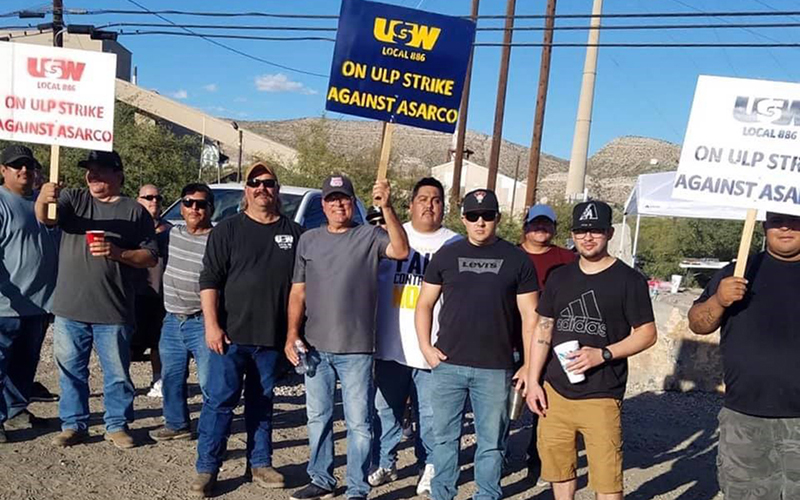
Striking workers made their demands known early in their strike against Asarco by projecting them on to the side of a company facility in Hayden. The strike is about to enter its third week, but union officials said there are currently no negotiations with the company. (Photo courtesy United Steelworkers Local 886)
WASHINGTON – Two weeks into their strike against Asarco, union officials said negotiations with the copper mining, smelting and refining company remain at a standstill and workers are starting to feel the pinch.
Members across several unions voted Oct. 11 to strike against company plants in Arizona in Texas after rejecting the company’s “last, best and final” contract proposal, which unions said “insulted” the workers.
Union officials said the company has not returned to the negotiating table since then. Meanwhile, pay and benefits from the company for the 1,775 striking workers expire Oct. 27.
“This has been a tough strike only because the company is so adamant about not bargaining in good faith,” said Chuck Grube, business manager for the International Brotherhood of Electrical Workers Local Union 570.
Asarco did not return repeated calls for comment about the strike or the prospect of negotiations.
Grube said his union and several other striking unions are rallying resources from local businesses and government agencies in Pima County to provide strikers food, health care and temporary jobs as the strike continues.
The Pima Area Labor Federation has opened a food pantry and hosted resource fairs for members during the strike. Chairman Paul Stapleton-Smith said the federation has received “tens of thousands of dollars” in donations from national unions, and can tap provisions it stockpiled to help federal workers during government shutdowns.
Stapleton-Smith said the federation will aid members for as long as it takes.
“We have a commitment that’s very simple: None of our union families is going to go hungry,” he said.
Although its members account for just eight of the 1,775 striking workers, the International Brotherhood of Boilermakers Local 627 has seen an outpouring of community support for members picketing Asarco’s Hayden concentrator, said business manager Jacob Evanson.

Workers man a picket line outside the Asarco facility in Hayden early in the strike. (Photo courtesy United Steelworkers Local 886)
With negotiations in limbo, he said his union plans to host more events to support the strikers.
“We’re going to continue backing our members for what we feel is right,” Evanson said before acknowledging that he has not seen a negotiation process as painstaking.
“I go through multiple negotiations a year. None of them have been this rough,” he said.
Asarco, a subsidiary of Grupo Mexico, claims to be the fourth-largest copper producer in the world, producing 350 million to 400 million pounds of copper annually. The current strike is the latest in years of labor strife for the company.
It emerged from bankruptcy in 2009, according to its website. A 2011 contract lowered pensions for workers hired after June of that year, but neither side realized the agreement would affect the so-called “copper bonus” payments, that court records say could be worth up to $8,000 a year per worker. Unions say the company may now owe as much as $10 million in back bonuses.
An arbitrator let Asarco keep the 2011 contract’s pension cuts but ordered it to pay workers their bonuses. The company took that ruling to court, ultimately losing this month when the U.S. Supreme Court let stand lower courts’ rulings that upheld the arbitrator.
The unions, which were represented in the most recent negotiations by the United Steelworkers, had been operating more recently under a 2018 extension to a 2017 contract with Asarco. Officials said nearly 77% of union workers voted against the contract that was rejected on Oct. 11.
Picketing began late Oct. 12 and early Oct. 13 at Asarco locations in Amarillo, Texas, and in Kearny, Marana, Sahuarita and Hayden in Arizona.
However low morale may be, Stapleton-Smith said the community outreach has inspired “fierce resolve” among strikers.
“These people are committed. These are fighters,” he said. “They’re up against an oligarch that has over $14 billion in net worth in Mexico.”
